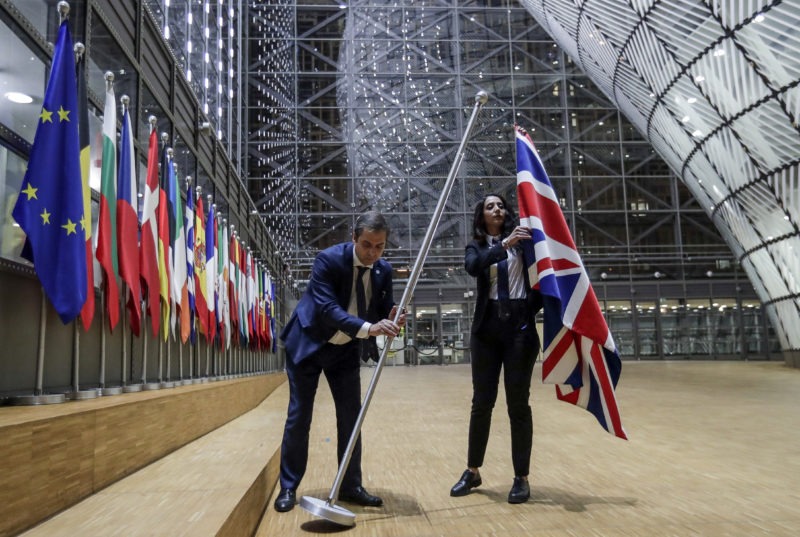EU envoys agree mandate for UK negotiations
Britain left the EU on January 31 after almost five decades of membership (OLIVIER HOSLET)
Brussels (AFP) – EU envoys on Monday finalised a mandate for chief negotiator Michel Barnier to lead what promise to be stormy talks with Britain on its future relations with the bloc starting next week.
The text, setting out the European Union’s demands and red lines, is to be formally adopted Tuesday at a meeting of the bloc’s ministers.
Britain is working on its own negotiating mandate, which it is expected to be published on Thursday.
Britain ceased to be part of the EU at the end of last month under the terms of a Brexit deal that ushered in a transition period for the big negotiations to take place on trade, security and defence.
The extent to which Britain will align with EU rules on environmental, labour, health, taxation and other standards is set to be one of the thorniest issues.
One EU source told AFP that the ambassadors adopted the mandate by consensus, adding: “It’s good news.”
The text “specifies that the agreement should allow us to have fair competition conditions over the long term,” the source added.
Another source said the mandate was “clarified on all necessary points”.
– Playing hardball –
Both London and Brussels have employed increasingly tough rhetoric in recent weeks.
Barnier, who has stood firm on EU positions, declined Monday to be drawn on the latest skirmish: a UK newspaper report alleging that British Prime Minister Boris Johnson was seeking to undermine the Brexit withdrawal agreement.
He told AFP he believed and hoped that deal would be “respected by the United Kingdom — I don’t have any reason to think otherwise”.
The Sunday Times report, citing an unnamed British government “senior source”, said Johnson’s negotiating team was looking at ways aimed at “not obeying the Northern Ireland protocol” in the Brexit deal.
That protocol requires checks on goods between Britain and its Northern Ireland territory in the interest of maintaining economic integrity between Northern Ireland and EU member Ireland.
The measure effectively puts a border for goods in the Irish Sea.
Johnson has repeatedly insisted that no checks would be needed, while his office said the UK “will comply with our obligations” under the withdrawal agreement.
On the other side of the table, France took the lead in injecting hardball conditions into successive drafts of the EU negotiating mandate.
Drafts of the text insist on a “level playing field” that “will stand the test of time”. That essentially demands Britain maintains standards equal to European ones, even if they change in the future.
That speaks to EU fears that Britain might try for a competitive edge by doing away with costly environmental, labour and tax norms.
It also says the EU alone will determine what British financial services will be deemed equivalent enough to be offered in the bloc.
And it says EU fishing boats should continue to be able to have access to British waters.
With Britain threatening to walk away and instead trade on only the most basic terms with the EU if necessary, the result of the negotiations — due to start next week and be completed by the end of the year — is uncertain.
French President Emmanuel Macron warned at the weekend he was “not sure” a deal would be struck by the end of December.
– No extension –
A “no deal” Brexit, with its heavy implications for the UK economy, does not seem to frighten the British government.
Johnson is asking for a simplified deal similar to those the EU has struck with Canada, Japan and South Korea that reduce tariff barriers to near zero, but which have less strict controls on standards.
“There is no reason that our proximity to the EU should mean extra restrictions on trade,” his spokesman said Monday.
“Proximity is not a determining factor in other FTAs (free trade agreements) between other neighbouring states with large economies.”
He insisted: “We will not accept alignment with the EU.”
London has until the end of June to ask for a deadline extension should the talks fail to make headway in the coming months.
But Johnson has ruled out asking for more time, a stance that raises the prospects of a “no deal” or only a bare-bones deal which could also bring major disruption.
Disclaimer: Validity of the above story is for 7 Days from original date of publishing. Source: AFP.


